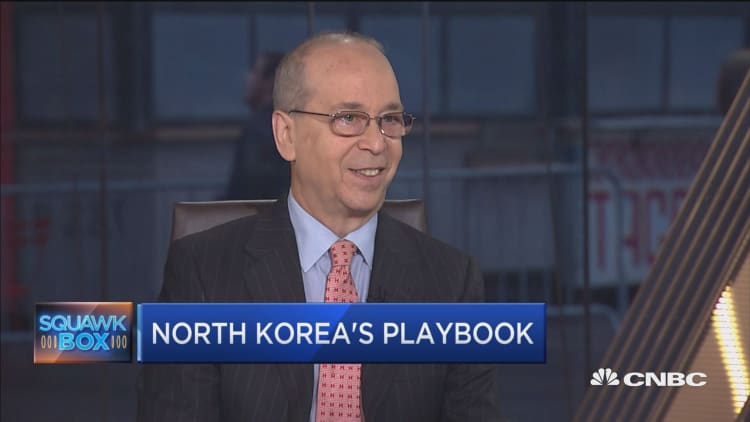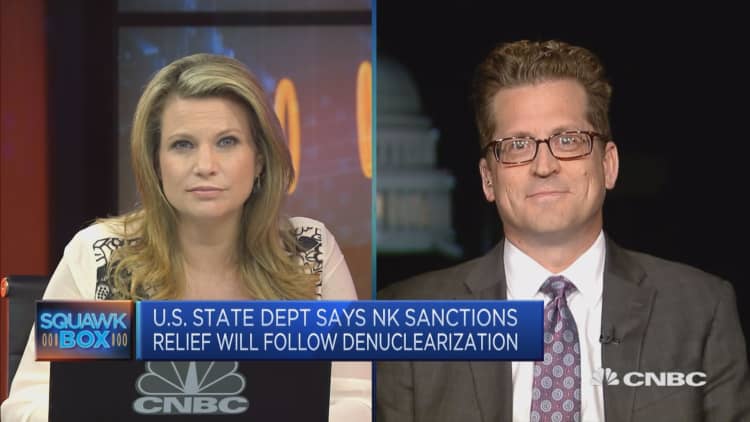South Korea's desire to engage and unify with its reclusive northern neighbor appears to be clashing with Washington's goal of eliminating nuclear weapons on the Korean Peninsula.
As the two Koreas make steady progress toward reconciliation — a South Korean train on Friday traveled across the border into the North for the first time in a decade — there are mounting concerns that peace efforts may overshadow the denuclearization of North Korea.
"We have made clear to the Republic of Korea that we do want to make sure that peace on the peninsula and the denuclearization of North Korea aren't lagging behind the increase in the amount of inter-relationship between the two Koreas," U.S. Secretary of State Mike Pompeo said in November.
From joint railway projects to sporting exchanges, South Korean President Moon Jae-In's government is looking to spend hundreds of millions on economic and cultural initiatives with Pyongyang to promote integration and reunification. So far, the two countries have agreed to reinstate a joint military commission, develop mechanisms for family reunions and even pursue a joint bid to co-host the 2032 Olympics.
In Washington, many are now comparing the rapid pace of warming inter-Korea relations with the slow progress of denuclearization.
Moon and his party have, so far, put more focus on the issue of unification or peace rather than denuclearization, to the extent of Moon being publicly seen as Kim Jong-un's top spokesman.Hyung-A KimAustralian National University
North Korea claimed it has closed a major nuclear test site and has promised to dismantle more facilities as part of an agreement between its ruler Kim Jong Un and U.S. President Donald Trump. But last month, the Center for Strategic and International Studies, a U.S. think tank, said it had identified 13 of an estimated 20 undeclared missile bases inside the isolated state, triggering concerns about Pyongyang delivering on its promise.
"Rapid inter-Korean rapprochement is badly out of sync with the stalemate on the nuclear track," said Daniel Russel, former U.S. assistant secretary of state for East Asian and Pacific affairs and current vice president for international security and diplomacy at the Asia Society Policy Institute, during an October speech.
Moon, who leads the leftist Democratic Party, has long advocated a policy of engagement and detente towards Pyongyang even as he comes under criticism for pandering to Kim.
"Moon and his party have, so far, put more focus on the issue of unification or peace rather than denuclearization, to the extent of Moon being publicly seen as Kim Jong-un's top spokesman," said Hyung-A Kim, associate professor of Korean politics at the Australian National University.

While that won't greatly affect Washington's efforts to pressure North Korea, U.S.-South Korea relations could grow more tense in the future, Kim continued.
More than half of South Korean university students believe unification is necessary, according to a government survey conducted in early November.
Moon's focus on reconciliation could "obviate the U.S. focus on nukes and missiles," Pusan National University Professor Robert Kelly said in a new note published on the Lowy Institute. "If North Korea is a partner for peace and relations improve, then its nuclear weapons matter less."
South Korea's presidential office has not yet responded to CNBC's request for comment.
There's another less-discussed reason for Seoul's prioritization of unification, according to Kelly: "The hope that the North's nuclear weapons will fall into the hands of a unified Korean state."
If Moon's goal of reconciliation works, it could eventually produce a unified Korea, said Kelly. Under that scenario, "the assets of the two Korean states would increasingly be shared," which could see a unified Korea inheriting the North's nuclear program, the academic wrote.
To many South Koreans however, those arguments don't reflect the realities of Moon's government.

Unification can never come ahead of denuclearization, according to Cheon Seong Whun, South Korea's former presidential secretary for security strategy from 2014 to 2017. Getting the North to relinquish weapons of mass destruction is an essential precondition for unification so it still remains a top priority for Moon, continued Cheon, who is currently a visiting research fellow at The Asan Institute for Policy Studies.
Researchers at the Korea Institute for National Unification, a government-funded think tank, echoed that sentiment in an October report, describing denuclearization as "a process to advance inter-Korean relations."

